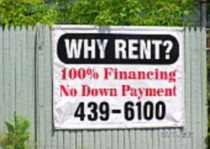Don’t option. Do a Non-Option Option. Post 171
 Mitch Goldstein | Coach Mitch | June 18th, 2011
Coach Mitch’s REFLECTIONS™
The concept of the Lease/Option is great.
A renter signs a lease and also buys the option, the potential, to purchase the home.
Tenants certainly do like the idea of being an owner. They are renting your home because they like it and the prospect of owning the home is appealing.
I have done my share of lease-options over the years. I have read that, industry wide, 80% of options expire without being exercised. This seems right because I have never had any optionee consummate a purchase.
The reason tenant’s don’t buy.
With a few exceptions, almost all renters would rather be owners. Since they would like to own, what is stopping them? The tenants credit history is stopping a purchase. Even in the day of the NIC/NAC mortgage, No Income Check / No Asset Check, there were persons who would not qualify because the only thing the bank would check is the credit report.
It is hard to get anything with a 550 FICO.
The reason people are renters is because they can’t get a mortgage. The reason they can’t get a mortgage is because they didn’t pay their bills on time, for a long time. This pool of people is large and their credit is bad. Of the 60% of the population that rents, at least 50% have credit bad enough that a mortgage is very hard to get, especially these days. That’s 30% of the potential buying market that has credit bad enough to deny the ability to get a mortgage. It’s a huge number of people.
Options to purchase are not a panacea.
There are reasons to not option. Granting an option potentially limits the owners ability to sell the property, should he choose, and it complicates an eviction, should it be necessary.
A new, better, clever way to sell an option for your property.
Therefore, I have expanded the lease/option idea and have created a new item: the Non-Option Option™ Coach Mitch’s Non-Option Option™ allows a renter to have the first right of refusal, if/when I desire to sell.
Coach Mitch’s™ Non-Option Option™ is the same as the lease/option in all other ways, excepting that it does not bind me, the seller, as a formal option would.
This is how the Non-Option Option works.
When the prospective tenant agrees to the idea of desiring to purchase, I explain that when they will go to banks to qualify for a mortgage, the option consideration should be the amount paid that was over the fair market rent. That is why some banks will not allow monies deducted from the rent to go toward the down payment. Banking logic dictates that the fair market rent was not paid and an upward adjustment is necessary to protect the banks interest.
Tenants view the “first right of refusal” the same as being an option.
For this opportunity, although labeled as rent, I take an additional amount over the regular fair market rent, which is not refundable, just like a regular option. I limit the total amount that I will allow to go toward the down payment. The renter can continue renting after the limit is reached, but it does not accrue toward a down payment – unless I make an exception, which I have done.
In one home, I receive $300 over the FMR, fair market rent, for the Non-Option Option™. When buying, the renters will have accrued $16000 toward a down payment. Since the $300/month overpayment is on top of the fair market rent, the bank will allow the fully accrued amount toward a down payment. I am trying to get the tenants qualified for a mortgage but their credit scores and buying habits are obstacles. They know this.
Example: The FMR, Fair Market Rent is $1000, the additional rent is $300 = $1300 total rent. The amount going toward a down payment is $300/month, yearly = $3600. The total accrued monies going toward down payment = $16000, over about 4.5 years.
Important
The selling price does not have to be a part of the agreement. At the time of purchase, an appraisal can set the price OR you can set a minimum value that you wish to get and against which the accrued monies will be an offset.
The benefits of Coach Mitch’s™ Non-Option Option™.
This practice has worked well for me. The tenant stays longer, secure that they are saving toward a down payment. I am not tied down to a particular tenant. If the tenant violates the lease, an eviction can proceed in the normal manner because the tenant does not have an inchoate (future) interest in the property, which a judge can view with a raised eyebrow.
The legal language is a simple line in the regular lease stating that, for a certain sum, paid each month, in addition to the normal rent, upon the owners decision to sell, the tenant has the “first right of refusal” to buy the home at a price to be determined. The monies are not refundable should the tenant choose not to purchase the home, or not be able to purchase the home.
The tenant is assuming the risk that you will be fair. Being fair to your tenant is your only requirement.
See Coach Mitch’s “Ridiculously Simple System…”™ for details.
I hope this helps.
|
Complimentary Report
10 Ways Coach Mitch's "Ridiculously Simple System..." Is An Extraordinarily Profitable Way To Invest

Ellis, you are Exciting Dear Coach Mitch,
I got the list of tax delinquent properties exactly how he explained to get it, and found the ones that didn't have any mortgages and not many liens.
I found one property I really wanted to pursue, so I drove by the house and saw it was vacant and talked to a neighbor sitting outside who had the owner’s number. I called the owner that night and asked what was her plan with the property. She signed the deed over to me for just a one dollar.
I started marketing the house that day and it was sold after two days on the market for $12,000 with me only investing one dollar.
The following week I found another property on the list of tax delinquent property that was vacant, up for auction and also free and clear of any mortgages with just a $600 lien on the property. I called the owner and asked what was her plans for the property. She stated she didn't want the property. I told the owner I would take full responsibility for the property. She asked what was in it for her? I said one hundred dollars and she agreed; I will be closing next week.
Coach Mitch’s program really works.
Ellis Davis St. Louis, Missouri
Ken – make it happen!
Hi Coach Mitch,
Thanks, that postcard template is a brilliant idea. The new strategy really puts us ahead of the curve. I can picture the seller thinking a developer has money and is willing to pay top dollar without any extensive haggle.
Yet, they most likely will still be willing to negotiate if need be. I really like your series of strategies to get the seller to lower the price if they get obstinate.
The new post card format and verbiage seems great. The sales message is very powerful.
That’s awesome work Coach Mitch!!!!
Best,
-Ken Barns, Oxnard, CA
TY Adam Coach Mitch,
This message is to say THANK YOU! Sincerely, I'm amazed by you. The time and energy you have invested in my personal growth goes far beyond anything I ever expected.
I've been wholesaling for nearly two years now and bought into so many programs by this point I couldn't even count them all. Coach, I love calling you Coach because that's what you truly are for me. I don't know if you realize this, but you just took a couple hours to role play with me and help me feel confident when talking with sellers!?!
Thank you for your commitment to my excellence in this business and as a person. It shines through in all that you do and all that you stand for. You're patient guidance through all this is changing my life, my family's life, and my new client's lives. I got into this business to do good and really make a difference for people. You are helping with an arsenal of tools for me to carry this forward. I briefly mention to other wholesaler friends what I'm doing, and no one has a clue and these are some big time guys.
What you're teaching me is a goldmine!!! Coach, thank you for guiding me through making my dreams a reality. I am a better person because I know you. You are a part of the solution. I am grateful.
ALL THE BEST!
Adam C. Stoker St. Louis MO
Delighted by Lynn
Working with and getting mentored by Coach Mitch has been a wonderful experience. I have learned so much about real estate from him, as he has such a wealth of knowledge.
He is always accessible whenever I have a question or need clarification of any sort. He is actually one of the most accessible coaches I've ever worked with. In addition, he is willing to work through various scenarios with you. I have to say some of the ideas he comes up with in our brainstorming sessions are the best!
I have become more confident in real estate and I know I have a business partner in Coach Mitch.
Lynn Lawson
Atlanta, Georgia
Juan, you’re great! I bought Mitch Goldstein 's Tax Lien Course two months ago and found his material very complete and very detail oriented.
His support was amazing. Any questions that I have, I just call him and got his response immediately. I have worked with several Real Estate Professional Coaches before and in addition to their high cost of the material they never have the time to support you.
Mitch has a well-deserved reputation for expertise, support, and professionalism in all stages of the Tax Lien/Tax Deed process.
Just to mention my last experience with him, he just spent 1 hour and a half explaining how to use my computer in a step by step process on how to find and analyze the information from the Hillsborough Court Clerk at Tampa Florida.
I would be very happy to recommend him to anyone interested in the Tax Liens and Tax Deed Investments. His in depth KNOW HOW and support, place him in an enviable position as a Real Estate Coach.
Juan Moises Mejia
Tampa, FL
WoW! Thanks a lot Jim Coach Mitch,
I like your style. Out of all the people I've listened to talk and all the people I've thought that were going to help me, you're the one. I just love your style. I loved your answers. The other night was the first time I ever heard you and I can't say it more. I was impressed with you. You had the answers.
I was nervous because I don't want to mess up the first call. But you said, "If you mess up the first one, don't worry about it, there are plenty more leads. If you mess up the first ten, don't worry about it, there are plenty more leads, thousands more." That's when I felt more relaxed.
I'm just so excited now. With everything I've been through, I feel I can make a turnaround with my life. I'm looking forward down the road and I just wanted to say - thank you.
Jim Misiora - Taylor, Michigan
Thank You Carl, see you at the top. Hello Coach,
Just wanted to thank you for being a responsible and stand-up guy. Since I first purchased your $1 option program, you have made yourself available to answer all my questions and concerns. You have gone over and above, in my opinion, to make sure that I stayed on point to accomplish my goals.
I will not hesitate to recommend you to anyone, at any time.
Thank you for the information you sent last night.
God Bless,
Carl Smith, Maryland
TY Jim – You’re great!. OK. I've been dealing with gurus and using their techniques. This is the first one that I am so excited about...especially the $1 Option.
If I may say so, I've never seen options explained like that. A $1 Option seems a little far fetched, but when I read this thing, I realize that it is as real as the telephone I have in my hand right now. This is a very good manual. This is a fantastic manual. It is powerful, very, very powerful.
James Harrison. - Phoenix, Arizona
excerpted from Post #3
Thanks James, you’re easy to work with. Dear Coach Mitch,
When I first heard you outline your “RIDICULOUSLY SIMPLE SYSTEM”, I was literally pacing my living room in excitement!
For years I have gone to several other seminars, bought all the tapes and even done boot camps only to have limited or no success. It seems like I was always missing something?
Well, this is exactly what I have been looking for. You are available to me one on one and your teaching style is engaging and informative. This education is worth every penny. I feel like all my past efforts were leading me to this point and I am confident that having my own personal coach will prove to be the best investment I could make!
Thanks for everything!
J. S Cocoa, FL.
Gloria, I’m glad you’re glad!
Hi Coach Mitch,
Thanks for the help I have received thus so far. I'm having a life-changing, God blessed experience since receiving your material on 10/24/13.
I didn't think I could comprehend the material because I truly know nothing about REI but, you explained the material in a plain and simple manner, like teaching A,B,C.........Z in a superb manner!
Thanks for sharing this whole new world with me. I am confident that it will have a dramatic affect in my life and the lifestyle and future of my family.
Thank - you Coach Mitch,
Gloria Karungi Detroit, MI
Right On Rick! Coach Mitch,
Just a quick note. Last night I came across some of your old newsletters. You are Really "On Top" Of Your Game...especially the one from October 14, 2008. What you were saying then...is today's news Now! You might enjoy going back and looking over it again yourself.
Your friend
Rick Ward in Lubbock Texas
|








Leave a Reply